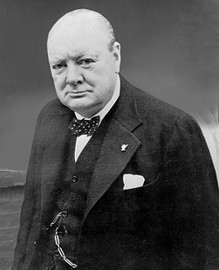
Just back from a weekend seminar in Switzerland, to mark the 60th anniversaries of Winston’s Churchill’s famous speech in Zurich (which you can read here) and of the adoption of the Hertenstein programme (which you can read here).
During the weekend, it was seemed as though the Swiss have solved a number of the problems facing other industrial societies. Of course, the trains ran with their customary timekeeping, as did the boats that ply the Vierwaldstättersee, and everywhere was very clean. In the city of Luzern, there is a pedalo hire station amid all the steamers and floating restaurants, and there were kayakers on the fast water that flows through the city centre. In many cities, leisure and business have to be kept sharply separated: the Swiss manage to keep all the different needs in a city together without sacrificing any of them. Very civilised, one might say.
Civilisation was a theme of the seminar as a whole. A fine introductory talk was given by Vernon Bogdanor, professor of government at Oxford University, on the theme of Churchill’s vision of Europe. The speech in Zurich was one among many when he argued for European unification, or, as he put it, reunification.
Central to understanding Winston Churchill, said Vernon Bogdanor, was his early experience in Victorian and Edwardian England. He was born in 1874, and shared many of the assumptions of that era. His belief in the enduring greatness of the British empire, in the face of much evidence to the contrary, was an example of this. His notion of the togetherness of Europe was another.
Prior to the first world war, there had been a European system of sorts. Economic integration was proceeding apace, international crises were resolved through the concert of Europe when great powers gathered together to right wrongs and smooth over difficulties. What held the system together was the notion that European countries all had enough in common to enable them to reach amicable solutions. Of course, every federalist knows that the institutional framework proved inadequate in July 1914, but the notion that European countries have something in common remains.
The speech in Zurich must have been rather a shock. Barely a year after the end of the most destructive war between France and Germany ever, Churchill was calling for them to unite on the basis of a new and equal relationship. Every previous war had been settled by the victors imposing terms on the losers: not this time.
Churchill’s speech did not address the new institutions that might be needed to make the new Franco-German relationship work: this was not really his object. What motivated him, though, was the notion of a European model of civilisation. This had existed, and should be rebuilt. While the details of the rebuilding remained – and indeed remain – to be settled, the starting point is the conviction that rebuilding is both necessary and possible. I guess you would not be reading this blog entry if you did not share that idea, too.
Thinking in terms of a Churchillian notion of European civilisation also helps explain his vigorous anti-Communism. Among members of the British government during the Russian civil war in 1919, he was the most vociferous advocate of intervention in support of the Whites. He feared the Bolsheviks greatly: they openly rejected the rules of European civilisation.
And Churchill was among the first to be so hostile to Hitler, too, predicting that the latter’s rise to power would inevitably lead to war. The settlement of what appeared to be legitimate grievances towards the Versailles treaty would not, in his view, meet German demands: they would only fuel more. Furthermore, Churchill was an early and persistent critic of Nazi racial policies; again, further evidence that the European model of civilisation was under threat.
A number of early federalists, among them Lord Lothian and C E M Joad, were sympathetic to the appeasers’ case. They thought in terms of a rational and ordered solution to the lingering injustices of the Versaiiles settlement, and did not pay enough attention to the political will that was needed to make such a solution work. Federalism is a rule-based system and there was – and is still – a tendency to think that the rules themselves are enough. That isn’t true, as history shows, and there is a need for the notion of a European identity, too.
